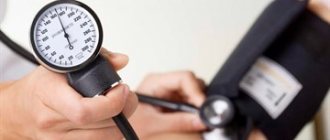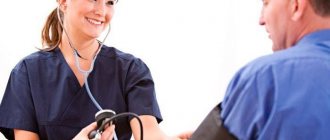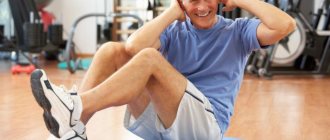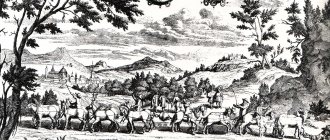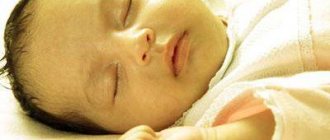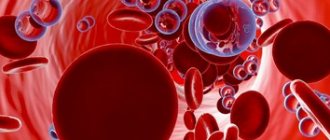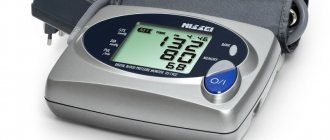Causes of low blood pressure
In old age, with vessels affected by atherosclerosis, low pressure can occur due to decreased tone of the smooth muscles of blood vessels and the heart muscle. During vagaries of weather and monthly hormonal fluctuations, the decrease in pressure can be significant.
Hypotension can be a consequence of nervous overstrain; it often develops as a consequence of infectious and other diseases, after viral and colds, flu, in the legs, as well as with insufficient or disordered nutrition, restrictive diets.
Standard indicators
Blood pressure is the force acting on the blood vessels. The definition of “arterial” refers to vascular pressure parameters. There are:
- venous;
- capillary;
- heart pressure.
Standard blood pressure indicators for vital functions are 120/80 (maximum 140/90). If the value is too high, there is a tendency towards hypertension. Maximum - the upper pressure is systolic, the heart muscle contracts. Minimum – diastolic (relaxation phase).
To determine the optimal blood pressure value, it is not necessary to focus on established standards. A person may well have individual characteristics of blood pressure. If there are non-standard indicators, you should pay close attention to your health and consult a doctor.
Pulse is an indicator of blood pressure. The norm for humans is 60-80 beats. /min. By measuring your heart rate, you can learn about an upcoming problem. If the number of heartbeats increases after 2-3 hours after eating, food poisoning can be detected. During magnetic storms, a decrease in blood pressure is observed. In response to this, the heart rate increases to maintain optimal blood pressure levels.
Symptoms of low blood pressure
In addition to feeling unwell, hypotension brings with it more significant problems:
- Reduced pressure leads to insufficient blood supply to all organs and oxygen starvation of the brain, which is more sensitive to lack of oxygen.
- The result is weakness, lethargy and fatigue.
- Signs of low blood pressure also include dizziness, often motion sickness in transport, daytime drowsiness and disrupted night sleep, which only intensifies fatigue and weakness.
- One of the most unpleasant symptoms of hypotension is orthostatic hypotension. When standing up suddenly and changing body position, dizziness becomes stronger.
There are primary and secondary hypotension.
| Primary arterial hypotension | This is an independent disease in which hereditary predisposition and constitutional characteristics play an important role (usually young women of asthenic physique - slender, tall, emotional). |
| Secondary hypotension | It develops against the background of other diseases, such as hepatitis, peptic ulcers, anemia, allergic reactions, in case of poisoning, as a result of the side effects of certain drugs. In this case, hypotension is not considered as a disease, but as a symptom that goes away after the cause is eliminated. |
Down with hunger
Hypotension often occurs on an empty stomach, so this condition should be avoided. With low blood pressure, people do not need to give up eating salty foods: cheeses, canned food, fast food, smoked fish, deli meats. Sodium retains water, maintaining normal vascular tone. Of course, you need to plan your diet taking into account your overall health.
A measured diet helps prevent unpleasant symptoms. Eating in small portions - 5-6 times in moderate portions - is healthier than taking long breaks. If you plan to do a lot of things, it is advisable to take thermoses or containers with ready-made meals with you, and have a “packed ration”: sandwiches, yoghurts, dried fruits.
Hypotension of training
Another form of hypotension that occurs in athletes and simply trained people is training hypotension. But reduced vascular tone does not play a role here, it’s just that the body of such people is constantly under increased stress and therefore is accustomed to working in an “economical” mode.
The main complaints with hypotension are decreased performance, irritability, bad mood, memory may deteriorate, the person becomes distracted, and finds it difficult to concentrate. Emotional instability, increased sensitivity to bright light or loud speech predominates. Headaches and dizziness are common manifestations.
Headache is often associated with fluctuations in atmospheric pressure, large meals, and prolonged standing. The pain is usually localized in the occipital region or frontal region, feels like heaviness, and as the pain increases, the patient feels as if there is “pressure from the inside” on the skull. Sometimes you may experience a feeling of heaviness in the stomach, bitterness in the mouth, loss of appetite, nausea, belching, heartburn, flatulence, constipation - that is, almost all gastrointestinal disorders. In addition, hypotensive men may have reduced sexual potency, and women often experience menstrual irregularities. However, menstruation is often painful.
Hypotonic people often feel tired even after just waking up. They have difficulty waking up in the morning, even after a long sleep, feeling sleepy. Activity and performance return to normal only after 2-3 hours, weakening again during the day. The peak activity of hypotensive patients usually occurs in the late afternoon. With increased physical activity, people with hypotension may experience an increase in pulse and heart rate, and sometimes there are unpleasant sensations in the heart area and shortness of breath, which sometimes make a person suspect that they have angina pectoris or other serious illnesses.
Many hypotensive people constantly yawn, but not because they are tired, but because they “don’t have enough air,” which sometimes causes fainting or darkening of vision when suddenly moving from a horizontal to a vertical position. Sensitivity to weather changes is also a hallmark of people with low blood pressure. Most often, they do not tolerate heat very well, and even worse is the autumn or spring off-season with cloudy weather and low atmospheric pressure. Such people feel best on sunny and frosty winter days with high atmospheric pressure or on warm sunny days in late spring or early autumn. In addition, hypotensive patients are sensitive to weather changes and changes in climatic conditions.
Difficulties getting up in the morning
The real problem for a hypotensive person is waking up in the morning.
A simple algorithm of actions that should be brought to automaticity can alleviate the situation:
- without getting out of bed when the alarm rings, lie quietly for a few minutes;
- then, smoothly stretch, take several deep breaths and exhales and a few more while holding your breath;
- blink 50 times;
- Clench and unclench your fists 10 times;
- rub the bridge of your nose until you feel a pleasant warmth;
- alternately tense each muscle group, simultaneously resting your head and heels on the bed;
- pull your knees to your stomach, straighten them sharply, do this several times;
- Now sit down in bed, start writing the entire alphabet with your head (nose), just move alternately: clockwise and counterclockwise.
All together it won’t take more than 5 minutes, but the effect will be noticeable all day.
Classification of conditions accompanied by low blood pressure.
- Physiological hypotension is low blood pressure, which is a variant of the norm or is temporary.
- Hypotension as an individual variant of the norm, i.e., a feature of a given person that does not cause him discomfort.
- Hypotension due to increased training (in athletes).
- Hypotension is adaptive (in residents of highlands, tropics and subtropics).
- Pathological hypotension is a disease whose main manifestation is low blood pressure, a condition that requires diagnosis, mandatory treatment and observation.
- Neurocirculatory hypotension (primary, which is an independent disease, most often caused by impaired vascular tone and vascular function).
- Idiopathic orthostatic hypotension. An independent disease, the main symptom of which is a drop in pressure when changing body position.
- Symptomatic (secondary) hypotension:
- acute form (with shock, collapse, fainting, allergic reaction);
- chronic form;
- a form with severe orthostatic syndrome, that is, with severe dizziness when changing body position.
- Reduced blood pressure in diseases of the nervous system.
Why does blood pressure rise?
Pressure fluctuations don't just happen. Blood pressure values are influenced by factors that are not always related to the incorrect functioning of the body. Increased blood pressure - review of lifestyle and diet.
Factors that cause increased blood pressure:
- Dehydration. The norm for human fluid intake is 2 liters, the water must be clean. In the absence of the required amount of water, the blood thickens, the heart functions at the maximum permissible speed, which provokes an increase in blood pressure.
- Eating fatty foods with significant cholesterol levels. Cholesterol plaques settle on the walls, interfering with the movement of blood through the vessels.
- High salt intake.
- Having bad habits.
- Frequent heavy physical activity, as well as lack thereof. With increased loads, disruptions in orgasm are observed, with physical inactivity, the outflow of blood worsens, and the strength of the heart muscle weakens.
- Frequent stressful situations.
- Heredity, menopause, kidney failure, head injuries.
Diagnosis and treatment
Considering the fact that hypotension can serve as a symptom of many diseases or be an independent pathology, an examination is necessary to exclude diseases that could lead to a decrease in pressure. In this regard, there is no strictly defined list of examinations. To understand why the patient has low blood pressure, a diagnostic plan is drawn up and prescribed strictly individually, taking into account the patient’s history and previous diseases.
When establishing the cause of the disease, therapy usually uses complex methods aimed at restoring and strengthening the vascular wall and treating the underlying disease, if required, strengthening the autonomic nervous system and immune processes. General stimulants are prescribed, for example, drugs containing caffeine.
Many herbal preparations, so-called “folk remedies,” also have a tonic effect, which can also help with low blood pressure (hypotension). Self-administration of such drugs, however, requires great caution, because the same substances can have different effects on different people. Sometimes a paradoxical reaction and deterioration of the patient's condition may occur.
You should not self-medicate for hypotension! Only a doctor can prescribe the drugs necessary for a particular patient after he has examined the patient and established the cause of hypotension and the characteristics of its course.
Fighting sleepiness
To avoid falling asleep on the go all day, it is recommended to drink coffee: in moderation, 2-3 cups. Hypotonic patients can indulge in this drink in the evenings without harm to their health. It does not cause insomnia, on the contrary: it returns a comfortable physical state and makes it easier to fall asleep. The next morning after drinking coffee, such people also feel more energetic.
But you need to be careful with green tea. Although it contains caffeine, other active substances in the drink dilate blood vessels, lowering blood pressure even more. For hypotension, strong black is more beneficial.
If you are very tired during the day, it is recommended to take a short rest: sleep for about 1–1.5 hours. This will allow the nervous system to reboot and give strength for the second half of the day. If this is not possible, it is advisable to have on hand collections of invigorating plants: lemongrass, eleutherococcus, ginseng root. In extreme cases, a can of energy tonic will do. But you can drink it no more than twice a month. Otherwise, the opposite effect will occur - vascular tone will decrease.
Recommendations for hypotensive patients
In order to quickly bring blood pressure back to normal, hypotensive patients must follow useful rules.
- Lead an active and healthy lifestyle. Any suitable physical activity is encouraged: Nordic walking, running, swimming, moderate work in the garden, etc.
- Get out into the fresh air often and go for daily walks.
- Get enough sleep. Hypotonic people are recommended to sleep longer than healthy people. 9 hours daily at least. This will help you feel good in the morning and keep your levels normal.
- Avoid severe stressful situations. If necessary, contact a psychotherapist.
- Stick to a healthy and healthy diet for hypotension. You need to have a hearty breakfast. You cannot exclude salty and fatty foods from your diet.
- Don't overwork or overwork. Work should be moderate.
- Drink plenty of fluids.
- Maintain immunity at a high level, increase it if necessary.
- Immediately treat emerging infections and viral diseases.
- To refuse from bad habits.
These recommendations were provided to us by a nursing home in the Leningrad region; they will help maintain healthy blood pressure at home, as well as the condition of the whole body.

